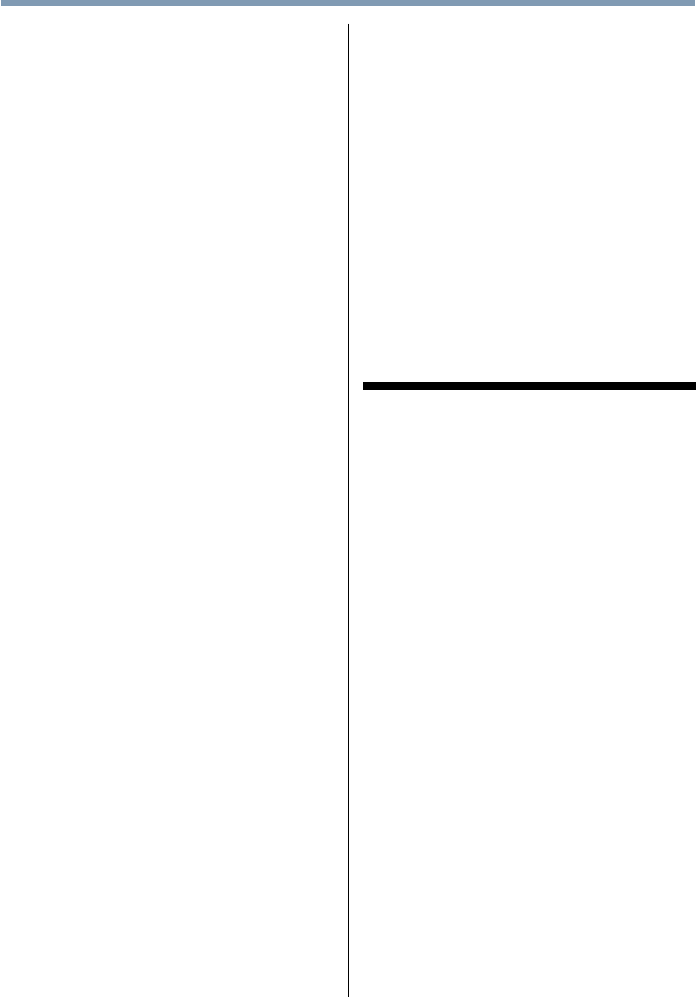
9
• Do not use benzene, paint thinner, alcohol, water,
or abrasive cleaners, which may damage the 3D
glasses.
• When not using the 3D glasses, put them in the
supplied glasses pouch and store them away from
high temperatures and humidity.
• Do not store the 3D glasses in areas of extreme
heat or cold, as deformation can occur. If
deformation occurs, replace the 3D glasses.
• The lenses of the 3D glasses are different from
those of ordinary glasses, and are very thin. Be very
careful in handling the 3D glasses as the lens can
pop out easily.
• Do not put excessive force on the lenses.
• Do not scratch the surface of the lenses with sharp
objects.
• Do not drop or bend the 3D glasses.
Notes on IR communication (for 58L9300 Series):
• Do not block the IR sensor for 3D glasses on the
TV by placing objects in front of it.
• Do not cover the IR sensor on the 3D glasses
with stickers or labels.
• Keep the IR sensor on the 3D glasses clean.
• The use of 3D glasses could interfere with
other IR communication devices. Other IR
communication devices may cause the 3D
glasses not to work correctly.
Use the TV and 3D glasses in a place where they
will not interfere with other devices or products.
Notes on watching the TV:
• Proper 3D effects or 3D-to-2D conversion
results may not be obtained depending on the
received 3D content.
• 3D effect and image quality may vary depending
upon content quality and display device
capability/functionality/settings.
• (For 58L9300UC Series) If you use any device,
such as a mobile phone or mobile wireless
device, near the 3D glasses, the 3D glasses may
not work correctly.
• (For 58L9300UC Series) Use the product in the
following temperature range; otherwise, the
quality of the 3D image or the reliability of the
product cannot be guaranteed.
- 3D glasses: 0º C - 40º C (32º F - 104º F)
• (For 58L9300UC Series) If there is uorescent
lighting in the viewing area, it may icker
depending on the frequency of the light.
In this case, reduce the brightness of the
uorescent light, or use another light. (It is not
recommended to watch the TV in a dark room,
especially for children.)
• Wear the 3D glasses properly, otherwise you
may not see the correct 3D images.
• (For 58L9300UC Series) When not viewing 3D
images, take off the 3D glasses; otherwise,
it may be difcult to see the display on other
products such as PC, digital clock, or calculator,
etc.
• The 2D to 3D conversion function is activated
and controlled by you according to your
personal preferences.
• The 2D to 3D conversion function is meant for
enjoyment of 2D home video, and other 2D
content you create, in 3D according to your
personal preferences.
• The 2D to 3D conversion function is not
intended for use with pre-recorded 2D
copyrighted content owned by a third-party
unless the copyright owner has given direct or
indirect permission, or unless applicable law
permits such use.
FCC Caution
To assure continued compliance, follow the attached
installation instructions. Any changes or modications
not expressly approved by Toshiba America
Information Systems, Inc. could void the user’s
authority to operate this device. Service Center or an
experienced radio/TV technician for help.
FCC Declaration of Conformity
Compliance Statement (Part 15):
Toshiba television models 58L9300 Series,
65L9300 Series, and 84L9300 Series comply with
Part 15 of the FCC Rules.
Operation is subject to the following two conditions:
(1) This device may not cause harmful interference, and
(2) This device must accept any interference received,
including interference that may cause undesired operation.
The party responsible for compliance to these rules is:
Toshiba America Information Systems, Inc. 9740 Irvine
Blvd., Irvine, CA 92618. Phone: 800-631-3811
Note: This equipment has been tested and found
to comply with the limits for a Class B digital device,
pursuant to Part 15 of the FCC Rules. These limits
are designed to provide reasonable protection against
harmful interference in a residential installation. This
equipment generates, uses, and can radiate radio
frequency energy and, if not installed and used in
accordance with the instructions, may cause harmful
interference to radio communications. However, there
is no guarantee that interference will not occur in a
particular installation. If this equipment does cause
harmful interference to radio or television reception,
which can be determined by removing and applying
power to the equipment, the user is encouraged to
try to correct the interference by one of the following
measures:
•Reorient or relocate the receiving antenna.
•Increase the separation between the equipment and
receiver.
•Connect the equipment into an outlet on a circuit
different from that to which the receiver is connected.
•Consult the dealer or an experienced radio/TV technician
for help.


















